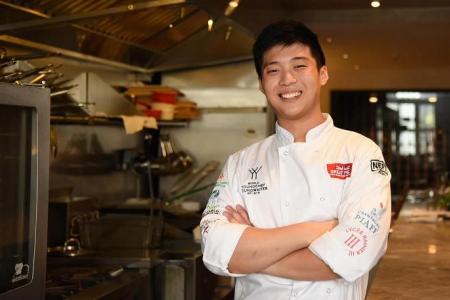How Singaporean Ian Tan won the world young chef award
Chef Ian Tan owes a debt to disaster. The kitchen was in a roil: two cooks had called in sick, a thousand diners had to be fed, the waiter was to step up.
Then a boy of 16, Tan was a blithe part-time waiter with no designs on cooking when he was thrust behind the swinging doors.
Now 27, he is an award-winning chef after his coup at the World Young Chef Young Waiter competition in November 2023. It was the first time in the 45-year history of the annual contest that an Asian chef had won with all-Asian dishes. The competition has an age limit of 27.
Patriotic in his palate, Tan presented a familiar dish with a maverick twist in the nine-man final.
A riff on the zi char classic kang kong cuttlefish, it was plated cold, on a baize of green herb sambal chilli, with wok-fired squid and poached watercress ringed by a garland of pickled carrots, beetroot and jicama, or bang kwang as it is known locally.
As with all Tan’s work, the busy description gives nothing away.
In taste, it was both new and recognisable, fine dining that smelled like local takeaway, chilled but smoked with wok hei.
The pleasantly confounding starter sampled by this reporter was the first dish of his three-course Peranakan menu that scored full marks at the awards, prompting one judge – Adam Handling, celebrity chef-owner of London establishment Frog – to declare it fit to eat everyday, Tan told The Straits Times.
But his glitzy victory in Monaco, that gilded city of epic wealth, concealed beginnings more humble than waiting tables.
At 14, Tan was a dishwasher in a cafeteria, led by restlessness, an uncommonly open mind and the draw of financial independence, or making his own pocket money.
At 16, not terribly concerned with his O levels and under the influence of popular boys’ anime Naruto, he joined a ramen joint as a waiter, determined to exploit his staff meals to the fullest.
After the serendipitous crisis, he became a dogsbody, doing the unglamorous work of chopping garlic, grabbing crockery and seasoning sauces. In his three years at the ramen shop, he never made a complete bowl.
“I felt alive, it was so fun,” he said of that time, “and I got to eat so much ramen.”
When at 18, it came time to choose a vocation, it was a no-brainer, he said. Tan rejected an offer for direct admission to Singapore Polytechnic to study music - at one point, the young Tan was also a jobbing drummer - and enrolled instead in the now-defunct Baking and Culinary Science course.
Food and music are both lively pleasures, he said, but only the former could he not live without.
His insistence on originality, or a kind of authorship over his food, arrived soon after, when he was ordered to cook someone else’s dish in a school competition. “I got a silver but it didn’t feel good,” he said.
After graduation, he discovered ambition, or the true scale of his desire.
In the last five years, Tan has been in and out of high-end kitchens, totting up 70-hour work weeks, putting in turns as a waiter on particularly lean shifts and even training his bladder to go once a day to save time. Once, his immune system was so diminished, he broke out in hives.
All without a grouse: “Service is service.”
“I knew what I wanted, to be part of a Michelin-starred restaurant,” said Tan, with the frank confidence of someone speaking in the past tense.
An eight-month stint at one Michelin star fine dining restaurant Seroja would help him over that hill. He said: “When I joined, they were new. I was part of the founding team that earned the first Michelin star.”
Tan was one of just six running the 2,700 sq ft establishment on Fraser Street.
There, cooking the cuisine of the Malay Archipelago, he was “transformed”. He is indebted to the team who taught him the limits of recipes, the cornerstone of lauded Italian and French cuisine, and turned his gaze to the cardinal points of Asian cooking – technique and produce.
Now Senior Chef de Partie of popular restaurant Bottega di Carna at the Mondrian hotel on Duxton Hill, Tan admitted to feeling burnt out by his string of fine dining positions.
“I wouldn’t be who I am today without them but I needed a change,” he said, gesturing at the eye-watering prices of ingredients that left no room for error, chefs running on fumes and the non-negotiable specifications of head chefs, so unfriendly to personal touches.
His plans for the near future include more charity work, more discovery and more joy, but one distant day, he would like to open his own place.
The details are hazy but of two things he is certain: It will be Omakase, with a guest list of grandmothers and maids – “every chef’s first teachers”.
Get The New Paper on your phone with the free TNP app. Download from the Apple App Store or Google Play Store now


